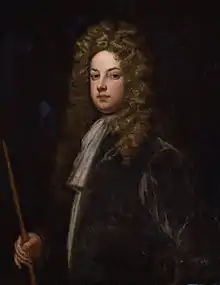Charles Howard, 3rd Earl of Carlisle
Charles Howard, 3rd Earl of Carlisle, PC (c. 1669 – 1 May 1738) was a British nobleman, peer, and statesman.
The Earl of Carlisle | |
|---|---|
 | |
| First Lord of the Treasury | |
| In office 23 May 1715 – 10 October 1715 | |
| Monarch | George I |
| Preceded by | The Earl of Halifax |
| Succeeded by | Robert Walpole |
| In office 30 December 1701 – 8 May 1702 | |
| Monarch | Anne |
| Preceded by | The Earl of Godolphin |
| Succeeded by | The Duke of Marlborough |
| Member of Parliament for Morpeth | |
| In office 1689–1692 | |
| Monarch | William III and Mary II |
| Preceded by | Sir Henry Pickering |
| Succeeded by | George Nicholas |
| Personal details | |
| Born | Charles Howard 1669 |
| Died | 1 May 1738 Bath, Somerset Kingdom of England |
| Spouse(s) | Lady Anne de Vere Capell |
| Children | 6 |
| Parents | Edward Howard, 2nd Earl of Carlisle Elizabeth Uvedale |
Charles Howard was the eldest son of Edward Howard, 2nd Earl of Carlisle, and inherited his title on the death of his father in 1692. He married in 1683 Lady Anne de Vere Capell, daughter of Arthur Capell, 1st Earl of Essex.
He was elected as MP for Morpeth in 1689. He was appointed Governor of Carlisle from 1693 to 1728 and Lord-Lieutenant of Cumberland and of Westmorland from 1694 to 1714. William III made him a Gentleman of the Bedchamber between 1700 and 1702, First Lord of the Treasury from 1701 to 1702 and Privy Counsellor in 1701. He acted as Earl Marshal between 1701 and 1706 because his cousin, the Duke of Norfolk, was a minor. On Anne, Queen of Great Britain's death on 1 August 1714 he was appointed Lord Justice of the Realm until the arrival of King George I of Great Britain on 18 September 1714. The new king reappointed him as First Lord of the Treasury from 23 May 1715 to 10 October 1715 and made him Constable of the Tower of London between 1715 and 1722.[1]
From 1699 to 1709 Carlisle was involved with the fraudulent schemes of pirate John Breholt. First Carlisle backed a plan to dive on and salvage a supposed wreck off Havana - Breholt even named his ship Carlisle - which came to naught, after which Breholt let slip that he intended to sail for Cape Verde and then to Madagascar to engage in outright piracy. A few years later Carlisle backed Breholt's plan (presented directly to Queen Anne) to pardon the pirates of Madagascar and have them return to England with their collected wealth. This scheme fell apart when Breholt's pirate past was exposed.[2]
In 1699 he commissioned a new Baroque mansion, Castle Howard, in Yorkshire, England to the design of Sir John Vanbrugh which is still occupied by his descendants.
He died in Bath in 1738 and is buried in the mausoleum at Castle Howard. He had six children:
- Henry Howard, 4th Earl of Carlisle (1693–1758)
- General Hon. Sir Charles Howard (c. 1696–1765)
- Lady Harriet Howard, died young
- Lady Elizabeth Anne Howard, married Nicholas Lechmere, 1st Baron Lechmere, then Sir Thomas Robinson, 1st Baronet
- Lady Anne Howard, married Rich Ingram, 5th Viscount of Irvine, then Brig-Gen. William Douglas of Kirkness (d. 1747)
- Lady Mary Howard, unmarried
References
- "Charles Howard, 3rd Earl of Carlisle". The Peerage. 6 October 2013.
- McGrath (ed.), Charles Ivar; Fauske (ed.), Christopher J.; Bialuschewski, Arne (2008). Greed, Fraud, and Popular Culture: John Breholt's Madagascar Schemes of the Early Eighteenth Century (in Money, Power, and Print: Interdisciplinary Studies on the Financial Revolution in the British Isles). Newark NJ: Associated University Presses. pp. 104–113. ISBN 9780874130270. Retrieved 21 February 2018.CS1 maint: extra text: authors list (link)
- Leigh Rayment's Peerage Pages
- Leigh Rayment's Historical List of MPs
- . Dictionary of National Biography. London: Smith, Elder & Co. 1885–1900.
.svg.png.webp)